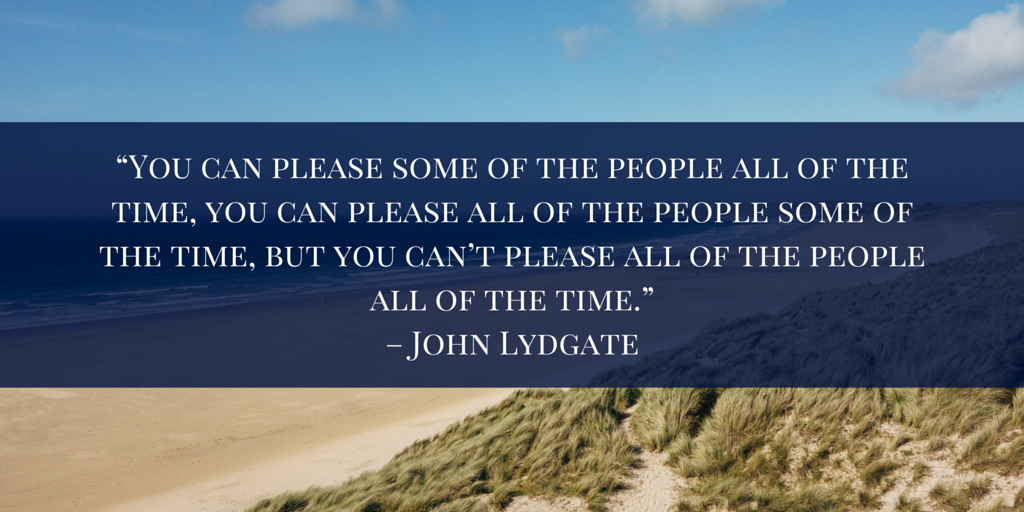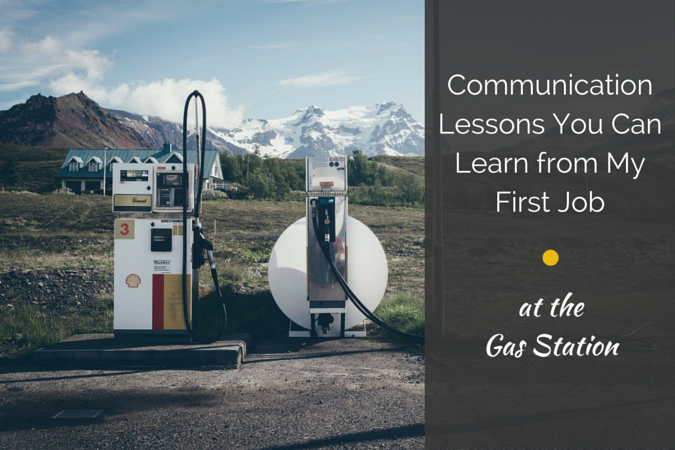“Turn the damn pump on!”
I still remember (vividly) those angry words shouted at me by that red-faced man.
He had been standing (impatiently) at his pump, annoyingly pulling his gas nozzle on and off several times in a vain attempt to alert me to—you guessed it!—turn on his pump. (If you didn’t know, when you pull the nozzle off the pump, the service attendant is alerted by some form of an onscreen notification and typically a loud beeping sound.)
This was my first day working alone. This was also my first week at my first job—a customer service representative at the local Shell gas station in the small town I grew up in. And this was about to be my first run-in with an angry customer.
There were three (or four) people in line, five of the six pumps were being used, and the cash register was doing anything but what I needed it to do.
And then the blaring from the register started, right near the end of an already lengthy transaction. I thought to myself, while rummaging for the current customer’s change, Surely he must realize he has to pay before he pumps, just like the other four people realized and either used their credit cards at the pump or came in with cash. (This was the year that pay before you pump started being “the thing.”)
Alas, he didn’t realize. Or perhaps he just didn’t care. Either way, just as I finished dropping a new set of pennies, frantically opening and dumping them into the drawer and rushing to hand the customer his long-awaited change, in bursts He Who Did Not Realize or Did Not Care (let’s call him “Mr. Red Face”).
“Turn the damn pump on!” Mr. Red Face shouted, startling me and the customers patiently waiting in line.
I looked up, quickly assessed his demeanor and with a customer service smile and calm voice said, “Sir, you have to pay before you pump.”
I swear I could hear his teeth grinding from 15 feet away and, if even possible, he turned redder. Clearly shocked and appalled, he responded with indignation, “Do you know how long I’ve been coming here?”
Since I didn’t want this to be my last day working alone during my first week at my first job, I thought it best not to respond with Have you ever seen me before, sir? No? Then I’ll make an educated guess and say that no, I don’t know how long you’ve been coming here. Not that it bears any relevance on the current situation, especially since there’s a big red sign on every pump that reads “pay before you pump” and has been there for months.
Instead, I simply repeated myself, adding, “I know it may be inconvenient, but the owners have asked us to not make any exceptions so that everyone is treated fairly.”
Fully expecting his last (rhetorical) question to have convinced me to turn on the pump (despite the fact that he could have just paid since he was halfway inside already), he let out one last indignant, haven’t-we-all-heard-this-before statement before slamming the station door:
“I’m never coming here again!”
Blinking a few times and taking a deep breath, I turned back to the patiently waiting customer with nickels and pennies still in hand: “Sorry about that. Here’s your change.”
“No need to apologize. That was completely uncalled for. Don’t let him mess up your day.” he responded. The other customers in line mirrored his words with head nods and sympathetic smiles.
I thankfully finished the rest of the day with no more…incidents. And little did I know that the next day I would return to work and be greeted by one of the owners with a smile and a few words of encouragement. Apparently one of the customers from the line had called and let the owners know about the incident, praising me for how I handled the situation. I was thrilled to say the least.
Experiencing that situation, as well as my remaining time at the Shell station, imbued me with valuable emotional intelligence skills and communication insights that I’ve employed throughout my career and still use today. Here’s two of them, inspired by this particular situation.
Check Your Anger at the Door
Recalling Mr. Red Face’s outburst, remember that anger won’t get you anywhere, especially in a professional environment (except maybe escorted out by security). Situations may frustrate you, aggravate you to no end, and even cause you to become extremely upset.

But it’s important to realize that being clouded by anger won’t actually solve the issue. And it won’t get you the results you want to see.
Instead, take a few seconds to consider the situation and the people involved. Ask yourself a few questions:
- Is the situation really worth getting angry over?
- Will expressing my anger make the situation any better?
- Can I find another way to resolve the issue?
Mr. Red Face could have asked himself these questions. But he didn’t. And the results were that he
- didn’t accomplish his original goal of getting gas;
- caused several other customers to be uncomfortable (and possibly even afraid); and
- prevented himself from returning to a gas station that was likely a convenient location for him (inferring from his rhetorical question).
Here’s two alternatives (of the many) he could have taken.
Alternative #1. Of course, he could have simply come in and stood in line to pay like everyone else, gotten his gas, and then left with no issues. Or—as I learned some customers would do over that summer when they were in a rush and wanted to avoid waiting in line twice—he could have come in, handed me cash, informed me of his pump number, and let me know he planned to fill up.
Alternative #2. He also could have entered calmly and said, “Hey, I know this station has a pay before you pump policy, but I come here all the time and I’m really in a rush. I promise I’ll be right back in after I’m done filling up.”
This short statement would have accomplished three things: (1) Acknowledged that he was aware of the station’s policy; (2) elicited sympathy for his situation; and (3) established some level of trust with me. And though there’s no guarantee I would have made his case an exception, it at least stood more of a chance than the anger route.
You Can’t Please Everyone
John Lydgate said it best about pleasing people:

It’s exceedingly improbable to please everyone. You can try, but you’ll only exhaust yourself in the process and still not accomplish the task.
There will always be that customer (or friend, or coworker, or boss) who just can’t (or won’t) be satisfied. Or just wants to make a fuss. Or finds something to nitpick on. Or thinks the world is theirs and everyone else just lives in it. Don’t expend your precious, limited time on folks like these.
What you can do instead, that’s much more worth your time and provides a greater return:
- Please the ones you can to the extent possible.
- Treat the customer who appreciates your help (or the friend who appreciates your friendship, or the coworker who appreciates your assistance, or the boss who appreciates your value) with care and responsiveness. Go above and beyond.
- Focus your time, energy, and efforts on the 20% that genuinely value what you offer. Quality over quantity.
Connecting the Pieces
It’s said that experience is the best teacher. I can attest to that. There’s something about being in the moment—living that context—that burns a lesson into you.
The way you felt. The thoughts you had. The way you reacted. The way they reacted. The choice you made. All the internal and external elements surrounding that situation culminated in some learning event that shaped who you are today and how you respond to similar situations in the future.
Yes, experience is a hell of a teacher.
I learned that on my first day of working alone during my first week of my first job. And, if he were honest in admitting it, I think Mr. Red Face did too.
What was your #careerlaunch? And what lessons did you learn that you still use today? Share in the comments section below.
This post was originally published on my LinkedIn profile on March 13, 2016, and was featured on LinkedIn Pulse in the Productivity and My First Job channels.

